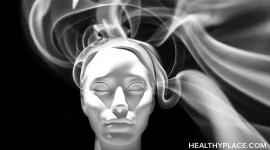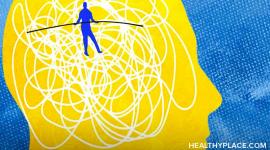What Are the Early Symptoms of Schizophrenia?

Schizophrenia has preliminary, or early, symptoms and signs that can signal that this mental illness is developing. These early symptoms of schizophrenia are known as prodromal symptoms, and the period of time during which someone experiences them is called the prodromal stage of the illness; however, someone’s symptoms or stage is described as prodromal only after the fact, once schizophrenia has fully developed and the symptoms can’t be mistaken for something else.
When do schizophrenia symptoms appear? The average time frame for schizophrenia to develop once prodromal symptoms begin is two years (DeLisi, 2011). However, schizophrenia is a very individualized illness, and the length of the prodromal phase varies. Prodromal signs can begin anywhere from months to years before the illness develops into schizophrenia.
First Early Warning Signs of Schizophrenia
The early warning signs of schizophrenia can be vague and mild. Family and friends of someone in the prodromal stage have described that it seemed that their loved one was “gradually slipping away” (American Psychiatric Association, 2000).
This sensation that a loved one is slowly slipping away is quite accurate, for essentially the person developing schizophrenia begins to undergo changes that involve turning inward into a world unknown to others.
Family and friends often describe changes in behavior and mood, such as developing different routines, withdrawal from activities and people, and low mood. Many of these early symptoms of schizophrenia resemble depression. The early warning signs of schizophrenia can be mistaken for not just depression but for an extended bad mood, a “phase” or teen angst (in the case of schizophrenia developing in adolescence), or substance use.
Other prodromal signs are mild forms of the hallucinations, delusions, and disorganized behavior and speech that are symptoms of schizophrenia. Someone might vaguely sense the presence of an unseen person; later, this might become a full hallucination, with the person hearing, seeing, or feeling someone who isn’t actually real. Likewise, in the early stage, the person might begin to form beliefs that are odd but not quite delusional.
Someone might experience a variety of specific early warning signs of schizophrenia throughout the prodromal period. Changes in behavior, emotions, thoughts, and cognitive functions can indicate impending schizophrenia.
Behavioral Early Symptoms of Schizophrenia
Friends and family of someone in the prodromal stage of schizophrenia often notice that their loved one is beginning to act differently. Changes in behavior are a significant warning sign. Such changes can involve:
- Withdrawal from friends, family
- Dropping out of activities once enjoyed
- Total isolation
- Lack of motivation
- Change in routines
- Unusual behavior, such as mumbling and talking to him/herself in public
- Potentially harmful behavior, like walking in traffic
- Neglecting personal hygiene
- Sleep disturbances, sleeping too much or too little
- Preoccupation with unusual ideas, such as extreme religious ideas, the occult, etc.
- Sensitivity to touch
- Increasing irritability
As with all warning signs of schizophrenia, these begin as mild and slowly intensify in the months or years leading to full-blown schizophrenia.
Emotional Warning Signs of Schizophrenia
Schizophrenia is an all-encompassing serious mental illness. Behavioral symptoms abound, but they’re not the only symptoms. Prodromal symptoms of schizophrenia involve emotions, too, and involve:
- Loss of pleasure in life (anhedonia)
- Loss of interest in things once enjoyed
- Blunted emotions
- Inappropriate emotions, such as loud laughter in serious or quiet situations
- Unexpected hostility
Behavioral and emotional symptoms serve as important early warning signs of schizophrenia. It’s also important to watch for changes in thoughts and cognitive functioning, as changes in these areas are also precursors to schizophrenia.
Early Symptoms of Schizophrenia Involving Thoughts, Cognitive Changes
Thoughts involve what someone is thinking about. Cognitive functioning refers to the way the brain processes and responds to information. Schizophrenia interferes in the contents of someone’s thoughts as well as her cognitive processing abilities.
Early schizophrenia symptoms in the areas of thoughts and cognitive processes make functioning difficult in many ways, such as:
- Focusing on and doing tasks that require focusing, such as reading, working
- Memory problems
- Difficulty making logical connections
- Struggles with math
- Absence, failure in school or work because of increasing cognitive difficulties
- Using incorrect words
- Vague, but understandable, speech
- Thoughts and ideas that are odd but not completely delusional or disorganized
All of these early symptoms of schizophrenia can, together, signal that something more serious is on the horizon. It’s important to keep in mind that any single—or even just a couple—symptom is not a sign of schizophrenia. Someone must have a combination of these early signs and symptoms, and these must gradually increase in number, intensity, or both until they are severe enough to be considered schizophrenia.
The early symptoms of schizophrenia are helpful warning signs for loved ones and doctors to monitor so a diagnosis can be made and schizophrenia treatment began as soon as possible.
APA Reference
Peterson, T.
(2021, December 22). What Are the Early Symptoms of Schizophrenia?, HealthyPlace. Retrieved
on 2025, December 30 from https://www.healthyplace.com/thought-disorders/schizophrenia-symptoms/what-are-the-early-symptoms-of-schizophrenia



